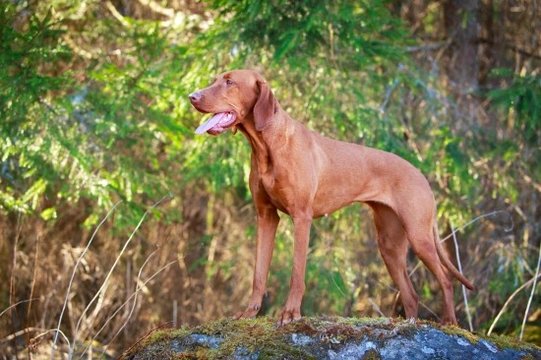
Is the Hungarian Vizsla a good choice of pet?
The Hungarian Vizsla is an incredibly handsome medium sized dog breed with a distinctive red coat, kind expression and long, drooping ears. A member of the pointer dog grouping, the Vizsla has the typical lean, fit pointer build, a superior sense of smell, and an incredibly pleasing amenability to training. For many years, the breed was not widely seen outside of their home country of Hungary, but today, the Vizsla is popular all across the world, and for good reason.
They are versatile, adaptable, loyal and loving dogs that fit in well in homes of all types, have a high level of working intelligence, and are able to perform a wide range of activities.
They are relatively lightweight given their height, but are lean and muscular and very fit in appearance, with defined muscles and a similar body shape to the Weimaraner dog breed. They are often mistaken for various other breeds or crossings of other breeds including the Weimaraner, and the Rhodesian ridgeback, but are of course, a separate breed in their own right. They are incredibly popular as pets with all sorts of owners, and have a strong following of enthusiasts both within the UK and further afield.
If you are wondering if the Hungarian Vizsla is the right choice of dog for you, in this article we will look at their core traits and care requirements in more detail. Read on to learn more.
What is the Hungarian Vizsla temperament?
The Hungarian Vizsla has a really lovely temperament and gets on with pretty much everyone that they meet, being personable, very affectionate and very loving with their owners. They love to make new friends but remain loyal to their families first and foremost, and love the company of people, becoming morose and unhappy if left on their own for long periods of time.
Despite their kind, loving natures, they remain as very versatile dogs that can easily be trained as watch dogs and guard dogs.
How much exercise do they require?
The Vizsla is a fit, active and lively dog that loves to explore, exercise and generally have something to do, and they are keen to take part in virtually any activity, including running, playing games and swimming. They are excellent dogs for canine sports such as agility, obedience and heelwork, and are happy and outgoing, as well as being excellent retrievers.
They need to spend at least a couple of hours per day out walking, and playing with other dogs or their handlers off the lead.
Are they easy to train?
The Hungarian Vizsla is both very intelligent and also very keen to please, making them incredibly pleasant to train, and capable of learning new skills from even a first time dog owner or trainer. They are quick learners and love demonstrating their skills and talents, and thrive on positive reinforcement training with lots of praise.
They are also rather sensitive souls that do not take to harsh words or negative reinforcement at all, and will soon become upset if their training is not rewarding and upbeat. They respect authority, try hard to accomplish what is asked of them, and are almost universally very obedient dogs in general.
They are capable of learning a wide range of commands, and retain the ability to learn new skills throughout their lives.
Do they get on well with other animals?
The Hungarian Vizsla is a kind, friendly dog that is generally very keen to play nicely with both friends and strangers, assuming that they are properly socialised when young. They can adapt their play to suit dogs of all sizes and levels of activity, and make for excellent dogs to socialise young puppies with for the first time.
As they have strong hunting instincts, they may hunt or pursue cats and small wildlife on instinct, but due to their high degree of amenability to training, can generally learn excellent recall skills and be taught not to pursue prey. This same trait means that when introductions are properly managed, they will usually be more than happy to share their home with cats, and also other dogs.
What sort of homes do they need?
The Vizsla is a very versatile dog that can live happily in all sorts of homes, from the moderately sized to the large, and in either the city, suburbia, or the country. They need to have good access to the outdoors and nice areas to go walking and undergo training, and tend to be quiet and incredibly well behaved within the home.
They require a reasonable amount of exercise, and will not be happy if left alone at home for the greater part of the day, and so live most happily within a family that is very canine-orientated, and keen to spend plenty of time with their dog.



